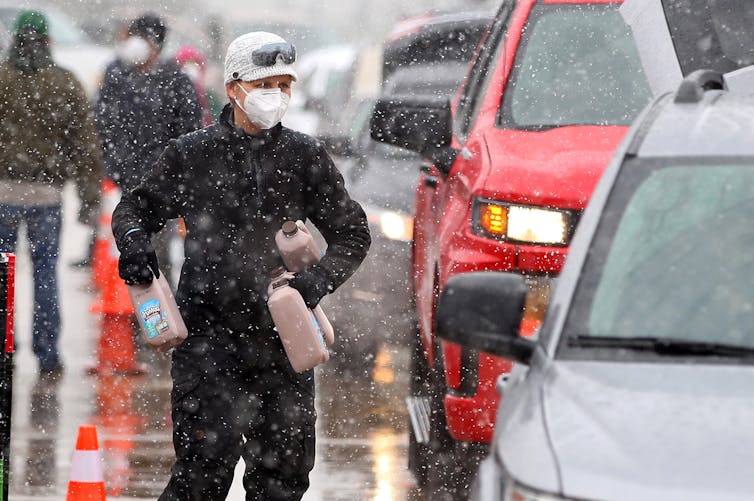5 lessons from the coronavirus about inequality in America
- Written by Jonathan J.B. Mijs, Lecturer on Sociology, Harvard University
The coronavirus is a global threat, but the pandemic has an uneven impact across the U.S. It exacerbates existing inequalities and creates new challenges.
I think this crisis can teach several important lessons about inequality in America: how it hurts, who it hurts the most, why that’s the case and what can be done about it.
1. Staying home is a luxury
For millions of Americans, staying at home is a luxury they cannot afford[1]. The comfort and well-being of all Americans depends on grocery clerks, delivery drivers and factory workers putting their own safety[2] second so they can stay on the job.
While the upper middle classes take their work with them, working and middle-class Americans are tethered to their jobs: 52% of college-educated people can work from home[3], as compared to just 12% of workers with a high school degree, and 4% of those without.
The same line cuts across race. White Americans are twice as likely[4] as African Americans or Latinos to have the option to work remotely.
The coronavirus highlights just one dimension of the increasingly polarized[5] U.S. labor market that offers varying degrees of autonomy for a lucky few, and precarious employment for the rest, marked by low wages[6], little to no benefits[7], a lack of control and security[8], and temporary contracts[9].
 A food bank volunteer loads chocolate milk into a car in Oak Park, Mich.
Gregory Shamus/Getty Images[10]
A food bank volunteer loads chocolate milk into a car in Oak Park, Mich.
Gregory Shamus/Getty Images[10]
2. Wealth divides Americans
In the U.S., wealth – which includes savings, investments and the prospect of inheritance – is divided unequally[11].
The wealthiest 20% of Americans have 90% of the pie[12]. The poorest 20% are US$6,000 in debt.
For those who have it, wealth brings political influence[13], priority medical treatment[14] and a lifeline in times of crisis. But decades of stagnant wages[15] have drained many other Americans’ savings.
Wealth inequality means the coronavirus may pose a risk[16] to some, but a double threat[17] to others. As the Federal Reserve reports, 40% of Americans[18] could not cover a $400 emergency expense.
The coronavirus is leading to higher rates[19] of job loss among poor Americans. According to new research, this may drag 21 million people[20] below the poverty line and leave them unable to feed their families[21].
3. Health care matters
Since 1942, health care in the U.S. has been tied[22] to employment. Losing your job can mean losing your right to medical care.
A third of Americans without a high school degree do not have health insurance, compared to just 5% of college graduates.
Lack of access to mental health care and addiction treatment[23] are part of why those without a college degree are four times as likely to die a “death of despair[24],” by suicide, alcoholism or drug abuse.
While awaiting the final death count of this pandemic, epidemiologists report that past flu and tuberculosis epidemics especially hurt low-income communities that lacked access to health care[25].
In low-income communities, rates of preexisting conditions[26] are higher, the uninsured may delay or forgo care[27], and medical services, already stretched thin, may be unable to provide treatment[28]. These are neighborhoods like Jackson Heights and Corona[29], Queens, which account for almost triple the rate of cases[30] as nearby Manhattan.
Economic deprivation leads to higher mortality[31] and exacerbates rates of transmission[32], jeopardizing all members of society.
4. People like to blame victims
The president blames the coronavirus on China[33] and immigrants[34].
Meanwhile, the surgeon general has urged communities of color to avoid alcohol, tobacco and drugs[35], if not for themselves, then to protect their “abuela, Big Mama or pop-pop[36].” (When questioned later, he said that his remarks were not aimed only at communities of color.)
Their words reveal a tendency to blame[37] people[38] instead of circumstances[39].
Scapegoats[40] help maintain many Americans’ belief in a just world[41], where successful people pull themselves up by their bootstraps and poor people face hardship because of bad decisions.
My research shows a growing number of Americans[42] believe that hard work is all that stands between failure and success.
The daily discrimination[43] experienced by Asian Americans, sometimes singled out as culprits of the pandemic, is a reminder of the “probational nature”[44] of immigrants’ existence. In normal times they face stereotypes, but in times of crisis they are to blame.
 Street art in Venice Beach, Calif.
Mario Tama/Getty Images
Street art in Venice Beach, Calif.
Mario Tama/Getty Images
5. Fragility gives hope
The collapsing economy is a rude awakening, but its fragility hides a transformative power.
The coronavirus proves a sociological truth, a theoretical perspective informing decades of research: The social order is what people make it to be.
These past weeks, changes thought to be unimaginable or unaffordable[45] happened overnight, from curtailed air travel[46] to paid sick leave[47].
In my view, the crisis is an invitation to put a new value on jobs and services — and to bridge the gap between worth and compensation. Why are today’s “essential workers” some of the lowest-paid[48] in the country? Whose services, today, do people miss the most?
It is an opportunity to set the “new normal”: a greener[49], kinder[50] and fairer[51] United States.
[Get facts about coronavirus and the latest research. Sign up for The Conversation’s newsletter.[52]]
References
- ^ luxury they cannot afford (www.propublica.org)
- ^ their own safety (theconversation.com)
- ^ can work from home (www.bls.gov)
- ^ twice as likely (www.bls.gov)
- ^ increasingly polarized (www.pnas.org)
- ^ low wages (www.brookings.edu)
- ^ little to no benefits (books.google.com)
- ^ lack of control and security (doi.org)
- ^ temporary contracts (www.jstor.org)
- ^ Gregory Shamus/Getty Images (www.gettyimages.com)
- ^ is divided unequally (www.youtube.com)
- ^ 90% of the pie (www.ncbi.nlm.nih.gov)
- ^ political influence (press.princeton.edu)
- ^ priority medical treatment (www.theatlantic.com)
- ^ stagnant wages (www.pewresearch.org)
- ^ risk (www.brookings.edu)
- ^ double threat (theconversation.com)
- ^ 40% of Americans (www.federalreserve.gov)
- ^ higher rates (www.economist.com)
- ^ 21 million people (www.povertycenter.columbia.edu)
- ^ unable to feed their families (www.nytimes.com)
- ^ health care in the U.S. has been tied (eh.net)
- ^ Lack of access to mental health care and addiction treatment (www.newsweek.com)
- ^ death of despair (www.npr.org)
- ^ low-income communities that lacked access to health care (theconversation.com)
- ^ preexisting conditions (www.healthaffairs.org)
- ^ delay or forgo care (www.cnn.com)
- ^ unable to provide treatment (www.nytimes.com)
- ^ Jackson Heights and Corona (www.nytimes.com)
- ^ triple the rate of cases (www.nytimes.com)
- ^ higher mortality (ajph.aphapublications.org)
- ^ exacerbates rates of transmission (www.nytimes.com)
- ^ China (www.businessinsider.com)
- ^ immigrants (abcnews.go.com)
- ^ avoid alcohol, tobacco and drugs (www.npr.org)
- ^ abuela, Big Mama or pop-pop (nypost.com)
- ^ a tendency to blame (www.verywellmind.com)
- ^ people (www.hup.harvard.edu)
- ^ circumstances (www.jstor.org)
- ^ Scapegoats (books.google.com)
- ^ belief in a just world (books.google.com)
- ^ growing number of Americans (blogs.lse.ac.uk)
- ^ daily discrimination (www.nytimes.com)
- ^ “probational nature” (www.nytimes.com)
- ^ unaffordable (www.nytimes.com)
- ^ curtailed air travel (www.economist.com)
- ^ paid sick leave (www.nfib.com)
- ^ lowest-paid (finance.yahoo.com)
- ^ greener (www.cnn.com)
- ^ kinder (www.nytimes.com)
- ^ fairer (www.nytimes.com)
- ^ Sign up for The Conversation’s newsletter. (theconversation.com)
Authors: Jonathan J.B. Mijs, Lecturer on Sociology, Harvard University
Read more https://theconversation.com/5-lessons-from-the-coronavirus-about-inequality-in-america-136024

